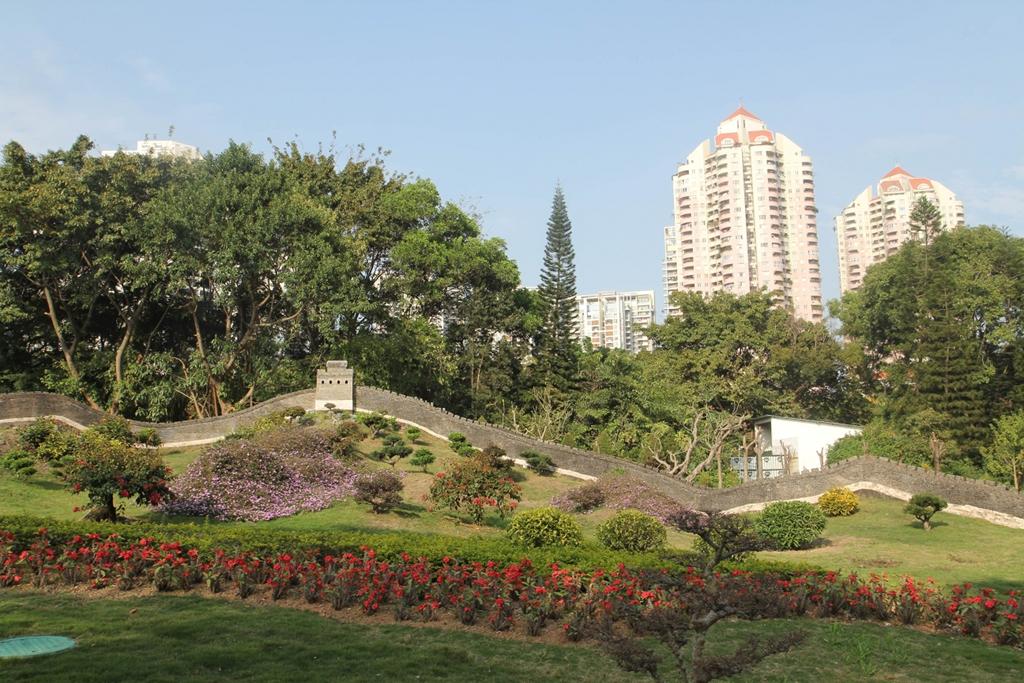Looking for a good time? Come to Splendid China Folk Villages
The not-so Great Wall of Splendid China stands one foot high.
SHENZHEN, China — You most certainly could not see this Great Wall of China from outer space, but you can see it reasonably well from a golf cart parked 20 feet away.
At one foot tall, this miniature reproduction of China’s most iconic sight is the highlight of Splendid China, a bizarrely sedate theme park on the outskirts of the southern boomtown of Shenzhen. I was invited to tour the park as part of its promotion for several new attractions for Chinese New Year, the country's biggest holiday
Built in 1989, Splendid China was the country’s first amusement park. Inspired by Dutch models, it aimed to bring a hundred of China’s classic landmarks to a population that could otherwise not afford to see them. Here you could see Confucius’s home reduced to the size of a large gingerbread house. Tibet’s famous Potala palace could have fit into a refrigerator box. The picturesque Yellow Mountain, lovingly depicted in traditional paintings, stood no higher here than an apple picker.
Little since then has changed. It remains pleasant if a bit dull. One particularly soporific section calls itself "Trees Planted by the Most Famous People in the World," featuring trees from Kissinger, Castro, and George H.W. Bush. Six Flags it is not.
But now, after two decades of economic and social transformation, Splendid China is trying to adapt to a different China. The early success has tapered off. In 1992, 7 million people came to visit the park, one employee told me. Now it’s closer to 1.5 to 2 million a year.
“This year is not so wonderful,” said Tiffany Wong, a research specialist at Splendid China. “We used to be the only park in China. You can imagine, now there are five just in Shenzhen.”
In fact, China has built so many theme parks that the government enacted a building ban in 2011. Of the 2,500 parks built across China in the last 20 years, less than 10 percent made a profit, according to data from the China Tourism and Attractions Summit.
Splendid China — which since 2003 has called itself Splendid China Folk Villages, after it merged with a neighboring park — has held on, making $1 billion RMB ($160 million) in revenue last year, according to park employees. But as the wealth and sophistication of China’s population have increased, so have their expectations for entertainment.
"People are getting richer, so they can go to the see the original places," thereby eliminating the appeal of miniatures, says Wong. "That's one problem."
Splendid China officials realize that a static park of statues doesn’t quite cut it for Chinese tourists today. On a pleasant afternoon this week, no more than 25 people were strolling in the miniatures section of Splendid China.
“We are developing a master plan” to change the park, said Wang Fan, vice general manager of Splendid China. “The demand of customers has changed, so we have to adapt to their tastes. Our park is about viewing in a very passive way, but parks now are more interactive.”
Splendid China, which is controlled by the state-run China Travel Service corporation, has hired American consultants to create a new conception for the park, which will be rolled out next year. The Americans’ first proposal was rejected, one employee said, because it didn’t show an adequate grasp of Chinese culture and history.
Nowadays, the majority of tourists prefer the Folk Villages section of Splendid China, a fun, campy set of "villages" featuring some of China’s 55 officially-recognized minorities. Once or twice daily, tourists clap as a Wu performer licks a torch and walks on blades. In another village, a Dong man climbs a 30-foot pole on steps made from knives. At the exhibit of Li people from the tropical island of Hainan, young men smash coconuts with stones and start a fire with sticks. At 4 p.m., horse-riding acrobats re-enact a battle between the Ming Dynasty and Manchu invaders. It's like a living museum of anthropology merged with a Renaissance Faire.
The future, Splendid China employees say, is in such spectacular shows. Twice daily, 70 dancers already put on performances that are gaudier, cheesier, and more ambitious than anything comparable in America. At various points in the performance, cannons fire; rocks talk; rain pours down from the ceiling; women dance with live peacocks in their hats; a pirate ship and catapult roll across the stage, as do a dozen live billygoats.
More from GlobalPost: 'Finnegans Wake' becomes a hit in China
The changing fortunes and focus of Splendid China underscore how radically Chinese society has changed since opening up. If Splendid China is a sign of China’s amusement park past, it may also be a sign of its future. China's emerging middle class wants entertainment equal to their growing status. And if — as with America's creation of Broadway musicals — that means more world-class dancing, pageantry, and irresistible schlock, all the better.
We want to hear your feedback so we can keep improving our website, theworld.org. Please fill out this quick survey and let us know your thoughts (your answers will be anonymous). Thanks for your time!
